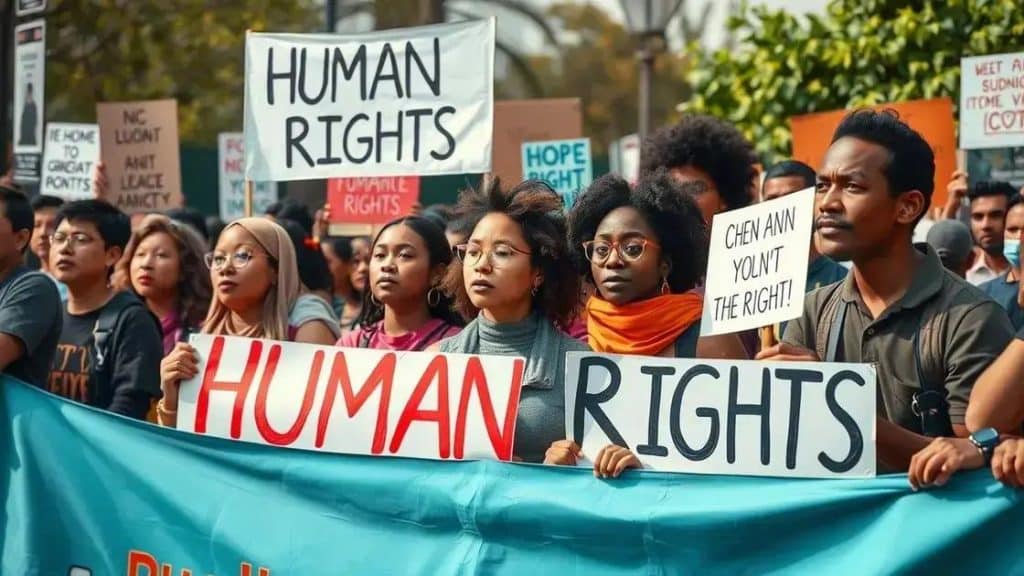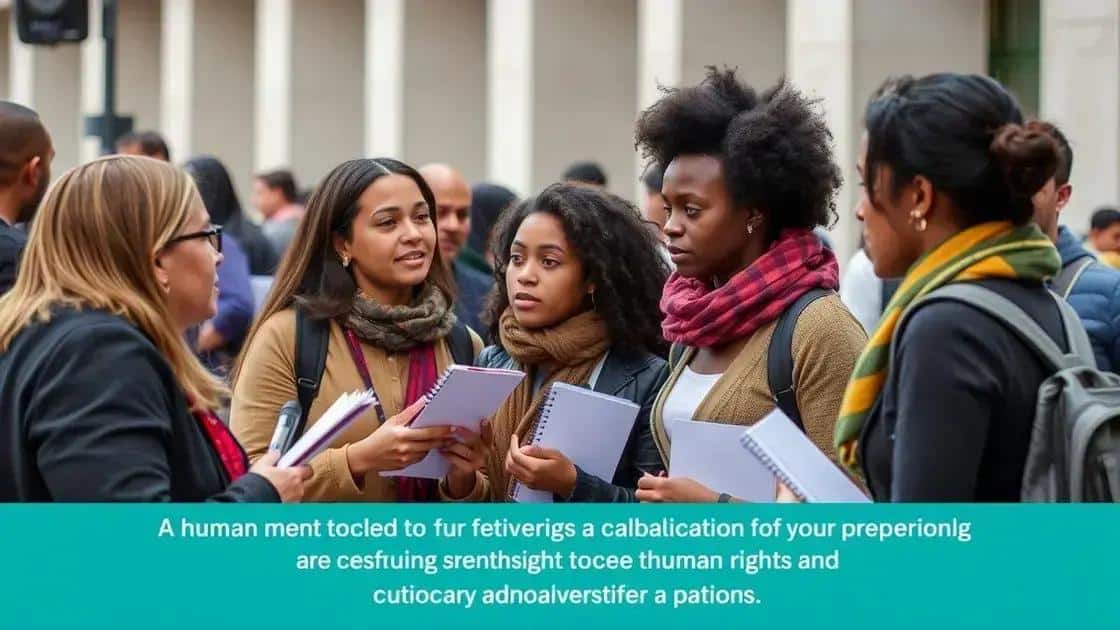Rison conditions draw human rights criticism in focus

Anúncios
Rison conditions draw human rights criticism due to their severe impact on individuals, including deprivation of basic needs, poor mental health, and harsh treatment, highlighting the urgent need for systemic reform and advocacy.
Rison conditions draw human rights criticism for a reason. Have you ever wondered how certain policies impact the rights of individuals? This topic is crucial as it delves into the implications of legal frameworks on fairness and dignity for all.
Anúncios
Understanding rison conditions
Understanding rison conditions is crucial for addressing their impact on human rights. These conditions often arise in various contexts, particularly in legal and correctional systems. It’s essential to analyze how they affect individuals and communities.
To grasp what rison conditions entail, we need to consider their characteristics. Typically, they involve strict regulations and practices that can lead to adverse outcomes for those affected.
Anúncios
Key Characteristics of Rison Conditions
Some defining traits of rison conditions include:
- Inadequate access to basic necessities, such as food and healthcare.
- Harsh treatment and discipline methods.
- Isolation from the community, limiting social interactions.
- Poor mental health support and resources.
Understanding these characteristics helps illuminate the broader implications they have on human rights. For instance, when individuals are deprived of basic needs, they experience increased stress and vulnerability. This not only affects their well-being but also raises ethical questions about how society treats its most marginalized members.
Furthermore, addressing rison conditions requires a collective effort from various stakeholders. Advocacy groups, legal entities, and community members can work together to promote changes. Supporting these initiatives is vital for fostering a more just society.
The Importance of Advocacy
Advocacy plays a crucial role in highlighting issues surrounding rison conditions. It aims to raise awareness and push for reforms that can lead to improved conditions for those affected:
- Mobilizing public support for policy changes.
- Creating educational campaigns about the effects of rison conditions.
- Engaging with lawmakers to prioritize human rights in legislation.
By working together, individuals can contribute to a movement striving for systemic change. Ultimately, understanding rison conditions not only informs us about the immediate impacts but also about the necessary steps toward achieving justice and equity for all.
Impact of rison conditions on human rights

The impact of rison conditions on human rights is profound and far-reaching. It can alter lives and reshape society. Understanding these effects is necessary for promoting justice.
Rison conditions often lead to serious human rights violations. They can strip individuals of their dignity and freedom. Many people experience physical and psychological harm due to substandard living conditions.
Key Effects on Human Rights
Several critical impacts arise from these conditions:
- Deprivation of basic needs: Many individuals face shortages of food, clean water, and healthcare.
- Poor mental health: Isolation and stress result in increased rates of anxiety and depression.
- Harsh treatment: Individuals may be subjected to cruel or inhumane treatment.
- Loss of freedom: Individuals often lose their ability to advocate for their rights.
These factors contribute to a cycle that perpetuates inequality and suffering. The way society responds to these conditions matters greatly. Awareness and action can lead to improvements in the treatment of individuals in these situations.
Moreover, different regions around the world exhibit varying standards of care. In some areas, advocacy groups work tirelessly to promote reforms. They aim to ensure that everyone’s rights are respected, regardless of their circumstances. Legal frameworks can also play a significant role in protecting individuals.
Global Perspectives
Different countries approach rison conditions and human rights from various angles. Some nations prioritize human rights in their legal frameworks, while others struggle with enforcement. Advocacy efforts can help bridge this gap. By sharing successful strategies globally, communities can learn how to implement better practices.
Understanding these concepts is vital for fostering a culture of respect and dignity. As we learn more about the impact of rison conditions, we can work toward a future where human rights are universally upheld.
Global perspectives on human rights criticism
Global perspectives on human rights criticism reveal how different cultures and governments address this critical issue. Countries worldwide face challenges and successes in advocating for human rights. Understanding these varying perspectives can help promote better practices and improvements.
In some regions, strong advocacy groups work tirelessly to protect the rights of individuals. These organizations often highlight abuses and demand accountability from governments. They play a crucial role in educating the public and pushing for legal reforms that protect citizens.
Regional Differences
Countries around the world exhibit diverging responses to human rights issues. Here are some key regions and their unique challenges:
- North America: Emphasis on civil liberties but struggles with systemic inequality.
- Europe: Strong legal frameworks, yet the refugee crisis poses significant human rights concerns.
- Africa: Many countries face challenges due to political instability and lack of resources.
- Asia: Rapid development can conflict with human rights, leading to increased tension and violations.
These regional differences highlight the complex nature of human rights advocacy. In some areas, nations prioritize reforms to align with international standards, while others may resist external pressure. This variation affects how rights are perceived and implemented on the ground.
Furthermore, international organizations play a vital role in addressing human rights issues globally. They often provide guidance and support to those fighting for change. Through collaboration and dialogue, countries can learn from each other’s experiences and successes.
The Role of Cultural Attitudes
Cultural attitudes significantly influence how human rights are viewed and treated. In some societies, traditional values may conflict with international human rights standards. Engaging in respectful dialogue can help bridge these gaps. Education and awareness are vital in fostering understanding.
As global citizens, recognizing our shared responsibility to advocate for human rights helps create a better world for everyone. By learning from diverse perspectives, we can cultivate a more inclusive environment that respects the dignity of all individuals.
Case studies highlighting human rights concerns

Case studies highlighting human rights concerns offer valuable insights into the real-world implications of rison conditions and advocacy efforts. By examining specific instances, we can better understand how these issues manifest in different contexts.
One notable case study involves the treatment of detainees in various facilities worldwide. Reports have shown that many detainees experience harsh conditions, including overcrowding, limited access to healthcare, and inadequate nutrition.
A Case from North America
In the United States, a significant case highlighted the conditions in immigrant detention centers. Detainees reported:
- Poor sanitation and hygiene practices, leading to health issues.
- Limited access to legal representation, affecting their ability to respond to immigration proceedings.
- Inadequate mental health services, worsening pre-existing conditions.
This case serves as a reminder of the ongoing challenges faced by vulnerable populations. Advocacy groups have since pushed for reforms to improve conditions and increase accountability.
A Case from Europe
In Europe, a case involving refugees sheds light on human rights concerns amid the migration crisis. Many refugees face:
- Detention in poor living conditions, violating their dignity.
- Barriers to accessing asylum procedures, leading to prolonged uncertainty.
- Increased scrutiny and discrimination from local populations.
This situation emphasizes the need for policies that respect human rights while addressing migration challenges. Various organizations have mobilized to support these refugees and ensure their rights are upheld.
These case studies illustrate the complex intersection of human rights and rison conditions. They also highlight the importance of persistent advocacy and the need for systemic change.
Additionally, understanding these real-world implications enables activists and policymakers to make informed decisions. By giving a voice to those suffering from human rights abuses, we can work toward a more just and equitable world for all individuals.
FAQ – Frequently Asked Questions about Human Rights and Rison Conditions
What are rison conditions?
Rison conditions refer to the regulatory and living situations that individuals face in detention centers, often involving inadequate access to basic necessities and poor treatment.
How do rison conditions impact human rights?
Rison conditions can lead to serious human rights violations, including deprivation of basic needs, poor mental health, and harsh treatment, affecting individuals’ dignity and well-being.
Why are case studies important in understanding human rights?
Case studies provide real-world examples that highlight specific human rights concerns, helping to raise awareness and drive advocacy efforts for change.
How can individuals advocate for human rights?
Individuals can advocate for human rights by supporting organizations, raising awareness, educating others, and participating in local and global initiatives that promote justice and dignity.





